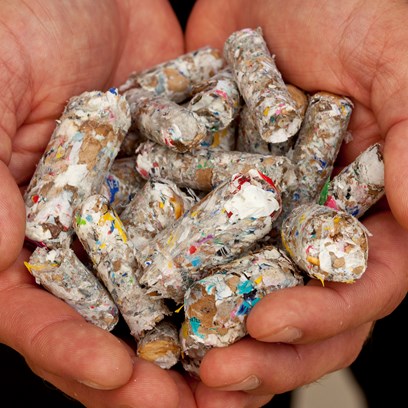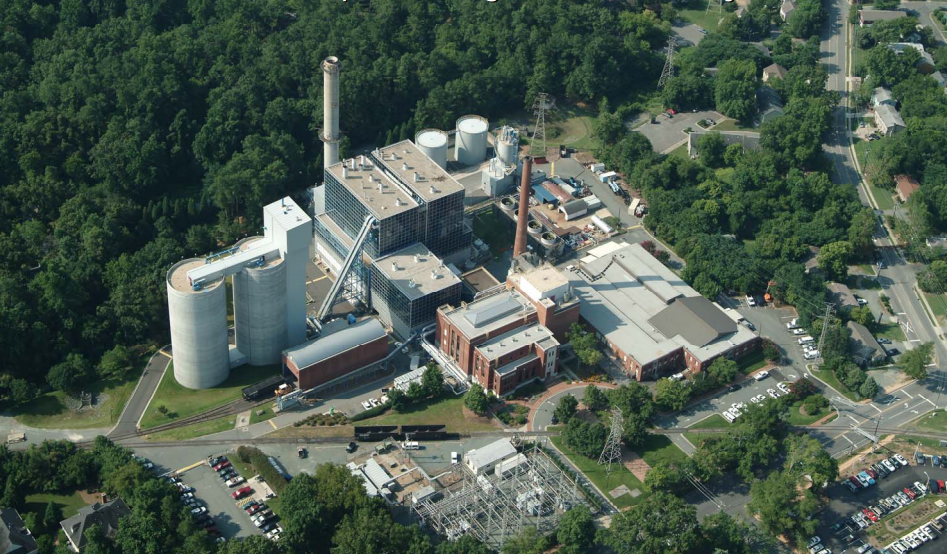UNC has long used its cogeneration plant on West Cameron Avenue to create steam to heat, cool and power buildings on its campus – burning coal as a key part of its fuel source. The university has also long explored alternatives to burn and is currently asking permission from the state to test a new option.
But that fuel has some questions surrounding it, with the greater Chapel Hill community set to ask those at a public hearing on Thursday.
UNC submitted a permit request to the North Carolina Department of Environmental Quality in August to test burning pellets made by the company Convergen Energy. The Wisconsin-based company takes non-recyclable industrial by-products like packaging materials and plastics and processes them into pellets meant to burn like traditional fuel. The goal, Convergen says, is to divert materials from landfills and lower emissions of particulate matter and sulfur dioxide that come from burning fuel like coal. Thanks to the product and its assistance in applying for permits, the company’s pellets have been approved as fuel sources in six states (Wisconsin, Michigan, Ohio, Indiana, Minnesota, and Iowa) since Convergen was founded in 2009.

Some of the pellets processed by Convergen Energy meant to be an alternative fuel for plants, like UNC’s cogeneration facility. (Photo via Convergen Energy.)
The request for pellet testing is just the latest step as UNC continues to scale back its coal consumption at the cogeneration plant by using alternative fuel sources. The university’s Sustainable Carolina department reports coal use is down 67% since 2007 and combustion emissions have subsequently dropped 38%. The campus and community’s reliance on the cogeneration plant make it difficult to fully or immediately transition away from coal, and the lack of an obvious physical – and reliable – fuel source led UNC to overshoot former Chancellor Holden Thorp’s pledge to stop burning coal by 2020.
The 12-month test period UNC is asking for would not be without its risks. While some emissions would fall compared to the plant’s current fuel mix, UNC and the DEQ say burning the pellets is expected to increase nitrogen oxide and carbon monoxide levels. Additionally, the pellets contain a small amount of per‐ and polyfluoroalkyl substances – better known as PFAS or forever chemicals. In its permit application, UNC called the trace amounts found by Convergen Energy “negligible,” with an early analysis projecting the Cameron Avenue facility would emit just more than one pound of PFAS each year. The university would also regularly monitor the PFAS levels alongside Convergen’s own examinations of the pellets before they are distributed from Wisconsin. But the chemicals’ effects are still being studied and it’s unclear how they could affect humans through emissions compared to water, where they are currently facing regulation by the EPA.
Chapel Hill Mayor Jess Anderson said it was this element that caught her and many others’ attention in the community when she learned of UNC’s request.
“We just want to make sure that the swap from one non-environmentally friendly fuel source to another… it’s aimed at reducing carbon emissions, but we want to make sure it doesn’t bring any other unintended consequences or health risks,” she told 97.9 The Hill.
Already, some local advocacy groups are rallying together to have people speak at the hearing — including an initial, successful push to move the meeting from Hillsborough to Chapel Hill. The Climate Crisis Committee at UNC shared a list of key concerns its leadership holds with the proposed pellet fuel, and the groups transparUNCy and Affirmative Action Coalition shared social media posts urging people to attend the hearing to oppose burning fuel with PFAS elements.

An undated aerial photo of UNC’s cogeneration facility on West Cameron Avenue. (Photo via the Carolina Planning Journal/UNC.)
While Chapel Hill Town Hall is being used for Thursday’s hearing, Anderson said it’s important to note for residents that the cogeneration plant and project is UNC’s – although Chapel Hill’s staff and elected officials are “interested on behalf of our residents.”
“We’re engaged, we’re paying attention… it’s not our decision, but we want to make sure that we’re part of the conversation,” said the mayor.
The Department of Environmental Quality’s process involves taking public comments at this meeting and additional written comments through Jan. 23 before weighing whether to issue the permit for testing to UNC and the cogeneration plant. Anderson said she looks forward to hearing other community members’ thoughts and concerns on Thursday, and that the hearing will provide an opportunity to potentially learn more about the alternative fuel effort.
“There’s a lot out there about PFAS and the impacts on water, the human body and the environment,” she said. “Of course, we wish [UNC] could do something totally clean like solar, but in the interim, I think it’s important to keep an eye on it and understand what the implications are. Especially [since] that plant is near some of our downtown neighborhoods.
“So,” Anderson concluded, “we encourage people to come out, learn and ask questions.”
Thursday’s public hearing is set to begin at 6 p.m. at Chapel Hill Town Hall. Additional comments can be submitted by email to DAQ.publiccomments@deq.nc.gov with the subject line “UNC.24A,” left by voicemail at 919-707-8448, or mailed to:
NCDEQ Division of Air Quality
1628 Mail Service Center
Raleigh, North Carolina 27699-1628
Chapelboro.com does not charge subscription fees, and you can directly support our efforts in local journalism here. Want more of what you see on Chapelboro? Let us bring free local news and community information to you by signing up for our newsletter.










